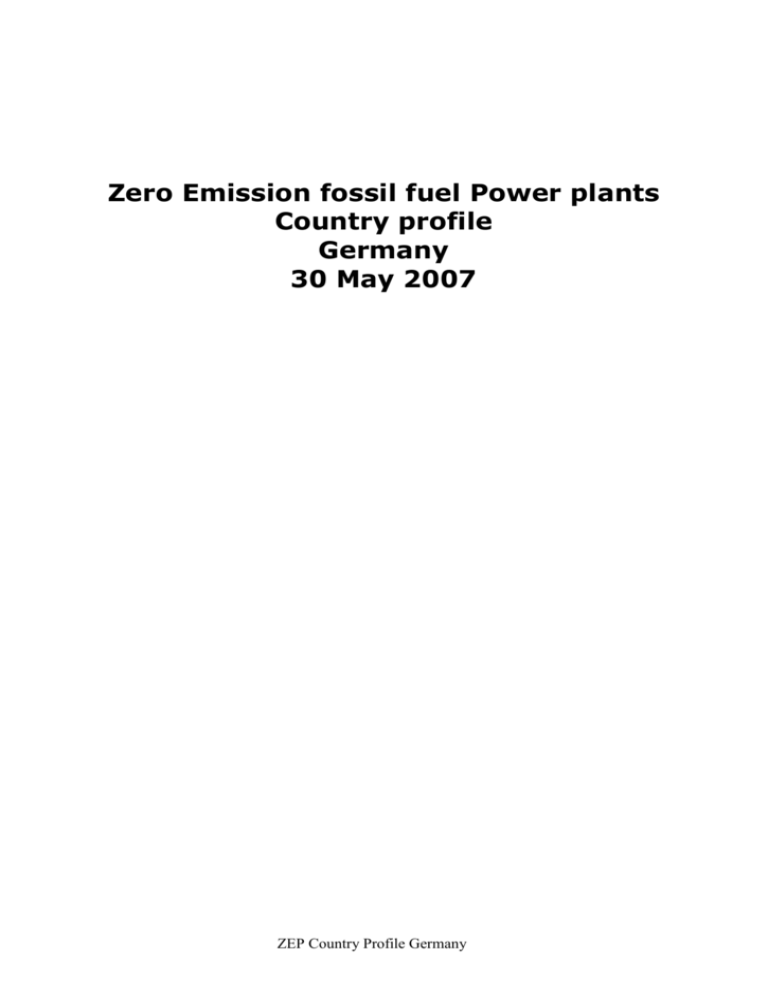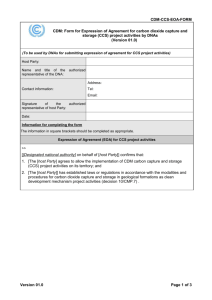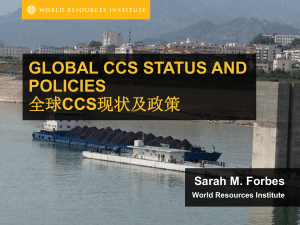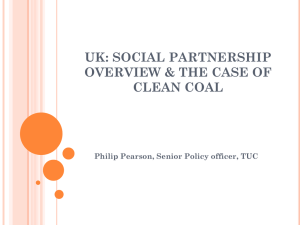Zero emission fossil fuel power plants
advertisement

Zero Emission fossil fuel Power plants Country profile Germany 30 May 2007 ZEP Country Profile Germany Introduction Energy outlooks show that fossil energy carriers will most likely remain a strong pillar of global energy supply in the future. This perspective is also valid for the EU and for Germany. On the other hand GHG emissions – particularly CO2 emissions - have to be strongly reduced to protect the climate putting pressure on the use of fossil energy carriers. In this context carbon capture and storage represents an attractive option because it would lead to a reduction of CO2 emissions into the atmosphere while at the same time allowing for continued exploitation of this natural resource providing a basis for economic development and wealth. 1 Background information Electricity Generation Demand for electricity has steadily risen from 570.6 TWh in 1991 to 653.6 TWh in 2004. For this period of time the annual growth rate amounts to approximately 1%. The share of traded electricity is less than 10 % of total electricity demand. In 2004 exports of electricity have dominated imports by 7.3 TWh. Approximately 60% of the electricity is generated from fossil fuels, i.e. hard coal, lignite and gas. Nuclear energy contributes to 29%, renewable energy, i.e. mainly hydro and wind deliver 11%. Demand for electricity is expected to continue to grow over the next decades. Detailed analysis shows increasing demand for new power plant capacities over time in Germany. A gap in electricity generation capacity of 40 GW is expected for the year 2020. Projects for new power plants resulting in a total capacity of 20 GW till 2012 have been announced already. Fig. 1: Prospective Future Demand of Power Plant Capacity. ZEP Country Profile Germany Energy and Climate Protection Policy In Germany, there is an ongoing debate on the political boundary conditions of future energy demand and supply. Increases in efficiency in all sectors of the energy system, strong support for renewable energy and a phase out of nuclear energy represent the major elements of German energy policy. Precise numerical goals indicate the direction for future development. Goals for the protection of the environment and for mitigation of climate change accompany the debate on energy policy and have additional impact on the debate of energy policy. Due to several measures the energy related emissions of NO x, SO2, CO and dust have been reduced. For emissions of CO2 the picture looks different. Over the past decade the emissions could only hardly reduced. However, the goal of reducing the emissions by 21% in the period from 1990 to 2012 in the context of European burden sharing will most likely be met. Present German energy policy is strongly committed to climate protection. Hence, additional pressure on the use of fossil fuels results from this policy. Under these circumstances carbon capture and storage (CCS) represents an attractive option. According to recent studies by Forschungszentrum Jülich the conversion sector has to contribute significantly to a strong reduction (-40% until 2030) of CO2 emissions. If CCS would not be available as a mitigation option increasing pressure on the enduse sectors would occur. In the case that CCS would exist as an additional option for mitigation this load could be reduced and the conversion sector could contribute to mitigation by up to 85%. CO2-Reduction in Mt/a for the 40% CO2-Scenario 0 2000 - 2015 2020 78% -50 2025 80% 74% -100 2030 84% Small consumer 70% 85% Residence -150 -200 Transportation Industry Conversion Net contribution 30 Mt Storage 60 Mt -250 Without CCS Without With CCS Without With CCS Without With CCS CCS CCS CCS Fig. 2: Potential of CO2 Reduction in Germany from CCS. ZEP Country Profile Germany Storage The assessment of underground storage represents an ongoing task in Germany. Only rough estimates of the potential capacities exist so far and vary quite strongly. They have to be specified in more detail with respect to quality and capacity. However, recent studies have identified storage capacities for CO2 in saline aquifers for a range of 50 to 100 years. Moreover, the locations of present power plants and suitable storages may not fit optimally. Energy-related Industry Total installed electricity generating capacity in Germany amounts to approximately 102300 Megawatt. E.On, RWE, Vattenfall, and EnBW represent shares of 34, 27, 11, and 7% respectively resulting in an overall share of 79%. As pointed out above these companies have announced various projects on CCS to exploit the potential of this technology for their future electricity generating portfolio. German coal production is mainly based on lignite – mainly used for electricity generation – represented by RWE Power and Vattenfall Europe. According to present regulation German hard coal production will be closed in 2018 because of outrunning subsidies. Germany is up to 97% depending on oil imports. An elaborated infrastructure for crude oil processing exists. German production of natural gas is presented by super regional companies producing or importing natural gas: E.On Ruhrgas, RWE, VNG, Wingas, and BEB. Government Research on storage is directed by the Federal Ministry for Education and Research (BMBF). Technological and industrial aspects of CCS are covered by the Federal Ministry for Economics and Technology (BMWi). The Ministry for Environment (BMU) deals with the environmental issues of CCS in terms of public private partnerships. 2 R&D According to the general understanding of R&D policy in Germany private research and public research should complement each other. While private research is directed directly to the development and improvement of products and services of German industry, public research covers basic research providing the knowledge and competence basis for future innovation in industry and society. Hence, great attention is paid to close linking of both sectors. At the national level, there exist two programmes of public research on CCS complementing each other: GEOTECHNOLOGIEN and COORETEC initiated and driven by the Federal Ministry for Education and Research (BMBF) and the Federal Ministry for Economics and Technology (BMWi). The programme GEOTECHNOLOGIEN aims at analysing the potential of geological formations for storing CO2. GEOTECHNOLOGIEN has been started in 2005. The total budget spent so far amounts to 80 million €. Over the past 3 years 9 million € ZEP Country Profile Germany have been spent on storage issues. In the programme 38 universities, 21 research institutions, and 25 partners from industry participate. The work is organised over 7 topical areas running more than 130 projects. COORETEC is directed to improve the efficiency of existing power plant technology (Strategy 1) and to explore the potential of new technological options (Strategy 2). The programme has been started in 2002. The first projects started in 2004. The annual budget presently amounts to 25 Million €. According to present planning the budget will continue to increase to a level of 35 million € in the year 2010. In COORETEC the work is organized in 5 working groups: natural gas combined cycle power plants (WG 1), steam cycle power plants (WG 2), IGCC with CO2-capture (WG 3), Oxyfuel plants (WG 4), and CO2-storage (WG 5). Fig. 3: COORETEC Roadmap. All relevant partners from scientific institutions, industry and ministries are engaged in the two programmes. 3 Implementation The general attitude of German industry towards ZEP is positive. Industry has recently announced to start demonstration projects on CCS in Germany: Siemens erects a natural gas fired combined cycle power plant with a net efficiency of above 60% at an E.On power plant site at Irsching/Bavaria. Net output will be 530 MW. An industrial consortium also supported by the EC operates the test facility COMTES 700 at Scholven to demonstrate the operational safety and reliability of a power plant ZEP Country Profile Germany at a steam temperature of 700°C. The goal is to proof integrity under real operation conditions. RWE Power develops and builds a zero-CO2 450 MW coal-fired power plant (net efficiency 40%) based on IGCC technology including CO2 transport and storage. Start of operation is planned for 2014. In parallel, RWE will develop the technology of CO2 scrubbing for future advanced coal-fired steam power plants and as a retrofit option for modern installations. Since 2005 Vattenfall runs a project to build a 30 MW th oxyfuel power plant which will be completed in 2008. The total budget is about 60 million €. CO2SINK represents a project funded by the EC and COORETEC to gain experiences with large scale underground storage of CO2 at Ketzin/Brandenburg. Injection of CO2 will start in summer 2007. Several projects on smaller scale ranging from basic research in materials research to the development of components complete the picture of activities on CCS in Germany. The legal framework for storing CO2 is under development. German government is aiming at a harmonized European understanding of this topic. Depending on the progress this could delay industrial projects requiring the storage of CO2. 4 Public acceptance The level of public awareness with respect to CCS is quite low. The maturity of the technology might explain this fact. So far, CCS represents a relatively new technological option and only a very limited number of demo projects has been initiated so far many of them being far away from Europe. Moreover, research on public awareness of CCS has just recently started to improve the knowledge about this topic. The started German projects are still ongoing. Systems Analysis and Technology Evaluation (STE) of Forschungszentrum Jülich, Fraunhofer Institute for Systems Research and Innovation (ISI) and Wuppertal Institute carry out a joint project on public awareness of CCS on behalf of the BMWi. Conferences, workshops and publications have been initiated to improve the overall knowledge of the public. 5 Government policy German High-Tech Strategy In the report “The High-Tech Strategy for Germany” German government outlines its view on the fundamental role of technology for the future development of the country. For the energy sector the report states “A comprehensive energy policy concept for Germany will bundle all measures being taken to ensure a sustainable energy supply. Germany will demonstrate its excellence in the area of environmental engineering and energy technology with beacon projects such as […] the COORETEC project aiming at a power plant with zero CO2 emissions.” In the context ZEP Country Profile Germany of the High-Tech Strategy German government plans for spending 2 billion € on energy technologies in the time period 2006-2009. International Activities German institutions actively participate in the international programmes on CCS, e.g. the Carbon Sequestration Leadership Forum (CSLF), International Energy Agency (IEA), and the European Commission (EC). The CSLF is devoted to stimulate and intensify international cooperation at the governmental level in the field of CCS. German government strongly supports the work of the CSLF. The IEA devotes significant resources to explore the potential of CCS and to promote projects on CCS. The Working Party on Fossil Fuels (WPFF) coordinates the work of the various Implementing Agreements. The Implementing Agreement Clean Coal Centre addresses the topic of advanced fossil fired power plant technology. The Implementing Agreement Greenhouse R&D Programme explores CCS from a holistic perspective considering all relevant issues ranging from technical via economic to political questions. The EC runs various activities on CCS ranging from projects in their Framework Programmes via the ERA NET FENCO to the Technology Platform on Fossil Fuels. 6 Lessons for ZEP CCS requires an integrated approach covering all steps from capture via transportation to storage of CO2. The maturity of the technology allows for a moderate number of large demonstration projects realized jointly by industry and the public sector. Legal issues have to be addressed in a European and international context to provide the proper framework for large scale implementation of CCS. A broad involvement of stakeholders is regarded as a fundamental prerequisite for the necessary public acceptance of industrial scale CCS. Having demonstrated the feasibility of CCS at industrial scale, CCS has to be established as a mitigation option in a post Kyoto climate protection regime. The implementation of CCS would require large investments because a new infrastructure has to be built up, and hence has to compete with other mitigation options. The operation of the first generation of CCS technology will most likely request improvements in all parts of the process chain. Hence, continued R&D on CCS represents an essential for the future. ZEP Country Profile Germany ZEP Country Profile Germany






